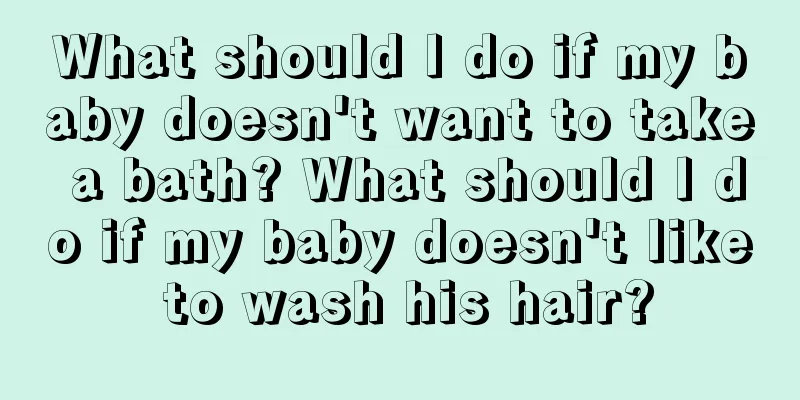What should I do if my baby doesn't want to take a bath? What should I do if my baby doesn't like to wash his hair?

|
Some babies show resistance when taking a bath, and parents don’t know what to do at this time. To solve this problem, we must first find out why the baby doesn’t want to take a bath so that we can prescribe the right medicine. What to do if your baby doesn't want to take a bath1. When bathing a child, we can call the child's name and interact with the child as much as possible to make the baby feel happy. Don't just treat the child as a dirty toy when bathing the child. We can also take out 2 to 4 toys such as little yellow ducks and put them in the water. When the child is bathing, if he shows some disobedient behavior, it is best not to hit the child. 2. Some parents will tempt their children with things. For example, if the child wants to take a bath, they will buy the child something delicious and fun to tempt the child to take a bath. Then one day you will find that when you do not reward the child, the child will not take a bath, because the child feels that taking a bath is not his own business, but he is helping his parents to complete a task. In addition, a fixed time needs to be set for the child. When the time comes, no matter what, he must take a bath. Bathing and washing hair cannot be changed under any excuse. 3. New parents may not know how to bathe their children. They are rough when bathing their children. If they hurt their children, they will be afraid of bathing. In addition, sometimes if you are not careful, the child will not stand firmly and the body will slip, so it is best to prepare anti-slip mats for children, and we can use some smaller bathtubs to increase children's sense of security. 4. Bathing your child is also a good opportunity for parent-child interaction. You can sing with your child, gently touch your child's skin, and make your child feel warm and comfortable. Reasons why babies don't like taking a bath1. Taking a bath at irregular times and infrequently, without forming a habit; 2. The water temperature is not appropriate, or it is too cold or too hot, which makes the child feel uncomfortable and afraid when seeing the water basin; 3. During the bathing process, something splashes onto the child's face or eyes, making the child feel uncomfortable; 4. The adults’ technique is wrong, which makes the children feel uncomfortable and afraid of bathing. What to do if your baby doesn't like washing his hairBabies and younger children, even if they like to take a bath, may not like to wash their hair, especially when they are about 2.5 to 3 years old. If your child does not like to wash his hair, you can temporarily give up washing his hair for a few weeks. Respect his desire not to wash his hair, but help him to deal with it correctly and gradually understand the necessity of washing his hair. For example, go out with him in the rain and let him experience how interesting it is to have raindrops falling on his face. When bathing, gradually let him accept shampooing. Wrap a face towel around his head to prevent water from flowing onto his face. Children who are afraid of water hate the feeling of water on their faces. If your child needs to use such a face towel, you can try to put a plastic ring on his forehead at the end of his hair to prevent water from flowing onto his face. Pay attention when bathing your baby 1. When the baby is just born to 5 or 6 months old, cradle cap grows on the head, which looks ugly and disgusting. It is best for the mother to gently apply vegetable oil to the baby's scalp, soften it first, and then gently wash it off. Never pick it with your hands. 2. When washing a newborn baby's hair, the mother should use the thumb and middle finger to block the baby's ears to prevent water from entering. The same applies to older babies, which should be waterproof and wipe off the water gently with a cotton swab in time. 3. If the baby's umbilical cord has not fallen off yet, or the belly button is red and swollen, and pus is flowing out, the mother must not let the umbilical cord get wet. Use a cotton swab dipped in hydrogen peroxide solution, or 75% medical alcohol to disinfect it, but do not wipe under the umbilical cord scab. 4. The wrinkles of the baby's skin, the neck, behind the ears, inner thighs, and armpits are all prone to redness, so they need to be washed carefully and gently. |
>>: What country is the brand of AMUSE dolls? Tokyo otaku cultural goods
Recommend
Can't have a baby with polycystic ovary? Pregnancy with polycystic ovary requires choosing the right time
Polycystic ovary syndrome can affect women's ...
What are the symptoms before ovulation?
It is easier to get pregnant if you have sex duri...
How to cultivate a good habit of taking a nap for your baby
Newborns spend most of their time sleeping, but a...
How to choose a nickname for a newborn? What are the techniques for choosing a name?
Have you ever seen newborn babies being named? To...
Can women still get pregnant after menopause?
Many women are older and don't know whether t...
A naughty child pours dirty water into the infusion bottle. How to discipline this naughty child?
Recently, an old lady in Zhengzhou, Henan Provinc...
What should I do if my baby always wakes up during sleep? How to improve my baby's sleep
It is very difficult for parents to coax their ba...
Can sweet potato leaves be eaten during breastfeeding? Can sweet potato leaves be eaten by pregnant women?
Sweet potatoes are really treasures all over. Not...
How to improve parent-child relationships and promote contact, what are the activity techniques
Creating a good parent-child relationship can hel...
Did Xie Na get pregnant through IVF? Is Xie Na's baby a test-tube baby?
Did Xie Na get pregnant through IVF? As soon as t...
Can babies eat pumpkin as complementary food? Benefits of eating pumpkin for babies
Pumpkin is sweet and soft after being cooked. Can...
Does Crest toothpaste come in a tin foil seal? How can you tell if Crest toothpaste is real or fake?
I bought a tube of Crest toothpaste and found it ...
Suitable for babies aged 0-1 years old. Introduction of finger nursery rhymes for babies.
What are some children's songs suitable for b...
Is it good to eat sesame paste before pregnancy? What are the benefits of eating sesame paste before pregnancy
Sesame paste can be paired with a variety of deli...
What kind of water is good for babies? What kind of water is good for babies?
What kind of water is good for babies to drink? W...









